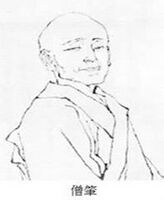Sengzhao
| PersonType | Category:Classical Chinese Authors |
|---|---|
| MainNamePhon | Sengzhao |
| MainNameTib | 僧肇 |
| SortName | Sengzhao |
| bio | Sengzhao. (J. Sōjō; K. Sǔngjo 僧肇) (374-414). Influential early Chinese monk and exegete, whose writings helped to popularize the works of the Madhyamaka school in China. Sengzhao is said to have been born into an impoverished family but was able to support himself by working as a copyist. Thanks to his trade, he was able to read through much of traditional Chinese literature and philosophy, including such Daoist classics as the Zhuangzi and Laozi, and is said to have resolved to become a monk after reading the Vimalakīrtinirdeśa. He later became a disciple of Kumārajīva and served as the Chinese-language stylist
for Kumārajīva’s translations. After Yao Xing (r. 394-416) of the Latter Qin dynasty (384-417) destroyed the state of Liang in 401, Sengzhao followed his teacher to Chang’an, where he and his colleague Sengrui (352-436) were appointed as two of the main assistants in Kumārajīva’s translation bureau there. Yao
Xing ordered them to elucidate the scriptures Kumārajīva had translated, so Sengzhao subsequently wrote his Bore wuzhi lun to explicate the Pañcaviṃśatisāhasrikāprajñāpāramitāsūtra that Kumārajīva and his team had translated in 404. This and other influential treatises by Sengzhao were later compiled together as the Zhao lun. Sengzhao’s treatises and his commentary on the Vimalakīrtinirdeśa played a crucial role in the development of Mahāyāna thought in China. Sengzhao is treated retrospectively as a vaunt Courier in the San lun zong, the Chinese analogue of the Madhyamaka school, which was formally established some two centuries later by Jizang (549-623). The influential Baozang lun is also attributed to Sengzhao, although that treatise is probably a later work of the early Chan tradition. (Source: "Sengzhao." In The Princeton Dictionary of Buddhism, 794. Princeton University Press, 2014. http://www.jstor.org/stable/j.ctt46n41q.27.) |
| YearBirth | 374 |
| YearDeath | 414 |
| Other wikis |
If the page does not yet exist on the remote wiki, you can paste the tag |

